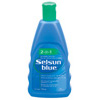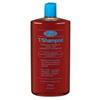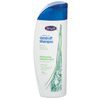Dealing With Dandruff
You notice a few white flakes on your shoulders and hope it’s snow. But after closer inspection, you realize you have dandruff again. This chronic condition is itchy and unattractive, but there are ways to control it. “There’s nothing to be embarrassed about and nothing you’re doing wrong, it’s just one of those nuisances of life that can be controlled with proper shampooing,” says Dr. Benjamin Barankin, a dermatologist in Toronto. That’s right, you can stop flaking with certain hair care products and a couple of simple application rules. Here’s why you’re battling dandruff and how to handle it.
At the root of dandruff
On everyone’s scalp lives a fungus called malassezia, which feeds on the sebum (oil) in the skin. Often, the yeasts reside peacefully and don’t cause problems. However, if and when they proliferate - what makes them do so isn’t really known - trouble begins. “If the conditions are favourable, the yeasts grow to a level when there is a low grade immunologic response to the organism, making the skin grow a little faster to produce dandruff,” says Dr. Richard Thomas, a dermatologist in Vancouver. Things such as stress, cold and dry weather, humidity and drinking a lot of alcohol can trigger or worsen a dandruff episode.

Why you?
If you’re a dandruff sufferer, you have a lot of company. Thomas estimates that about half the population contends with flakes. You’re more susceptible to it if you have a condition like HIV or Parkinson’s disease or an oily scalp. “It’s also more common in those who shampoo less often and it’s a little worse in men than women,” says Barankin. “And there seems to be some genetic predisposition to dandruff or seborrheic dermatitis.”

How to stop flaking
While there is no cure for dandruff, it’s often easy to control. What you need is a shampoo fortified with an anti-fungal agent, such as zinc pyrithione, selenium sulfide, coal tar or salicylic acid, to whittle the amount of dandruff-causing yeasts. Here are a few effective products to consider:

If you want one that will also pamper your hair, heed Thomas’s advice: “The ones I most commonly recommend are those from Head and Shoulder. They are not only effective but have the advantage of containing conditioners to best suit dry, normal or oily hair.”
Now, it’s important not to rush through shampooing, as it won’t be effective if you quickly rinse out the product. “You need to leave it on your scalp for a good 10 minutes, so there’s enough time for it to contact your scalp and do its thing,” says Bertucci. Some people need to use it everyday and for the long haul, others don’t. You’ll have to find the frequency formula that works best for your condition.
Severe cases of dandruff might require more help than the shampoos can provide. If your flakes don’t clear up after properly using an anti-fungal shampoo, consider visiting your dermatologist or physician for a topical corticosteroid.

